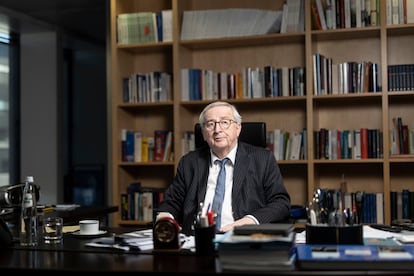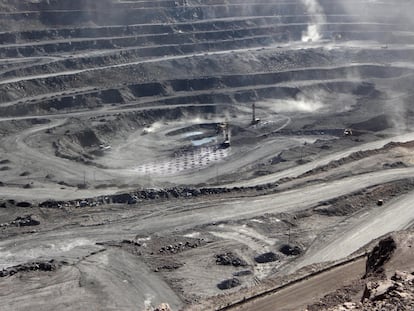Jean-Claude Juncker, former EU chief: ‘Trump’s goal is to divide us. And he will fail again’
The statesman who was president of the European Commision between 2014 and 2019 is writing his memoirs. In his office at the executive branch of the EU, he argues that the combined shock of Trumpism and the invasion of Ukraine is forcing Europe into a geopolitical awakening. ‘The era of Trump, Putin, and Xi,’ he declares, ‘forces Europe to defend itself’


“Any idiot can face a crisis.” This phrase by Anton Chekhov, the Russian playwright, is all the rage these days in Brussels. This is understandable, given the mix of new technologies and old instincts that characterizes Trumpism and which has dealt a formidable blow to global geopolitics. Indeed, any idiot can face a crisis… and any idiot can cause one.
“However, dealing with crises, day after day, is very tiring,” Jean-Claude Juncker sighs. The 70-year-old politician — who was born in Redange, Luxembourg — receives EL PAÍS at the door of his office. He has a space of his own in the glass-enclosed headquarters of the European Commission, and the television set at full volume. On the news channel, Germany is voting to end an era of austerity, a policy that caused colossal damage across the continent, by reforming its balanced budget amendment.
Juncker only agrees to lower the decibels of the set when the vote is finalized. “Seeing the Germans approve this is live history; it’s part of the famous zeitenwende, the new era,” he declares. During his conversation with this newspaper, he will switch between English, French and German.
The former prime minister of Luxembourg — who held that office for 15 years — is a veteran of many European battles. Juncker has an undeniable talent for politics (for old-fashioned politics, his critics say). Coming from a country of just over half-a-million inhabitants, he rose behind the scenes to chair the Eurogroup and become head of the EU’s executive branch between 2014 and 2019. He took office during the final throes of the European debt crisis. And then there was the refugee crisis, the first phase of the Russian invasion of Ukraine, Brexit, the first Trump term…
Even back then, it seemed like the world was about to end. But it didn’t.
This interview begins and ends — like two-thirds of all news stories over the past couple of months — with the inevitable Donald Trump.
Question. Has Trump put Europe back into “whatever-it-takes” mode, in the same way that “we’ll-do-whatever-it-takes” defined the European debt crisis?
Answer: The short answer is “yes.” Trump is forcing us Europeans to put our destiny in our own hands. Under the umbrella of the United States, Europe built a [supranational union] based on trade, on the strength of [the region’s] economy, on laws, on rules and on shared values with the Americans. The United States is turning its back on all of that. The Trump era — which is also the era of Putin and Xi [Jinping] — is forcing Europe to defend itself, to make every effort to strengthen its security. The umbrella of American defense has disappeared, just as we were forced to disconnect from cheap Russian energy when the war broke out, because we could no longer trust Putin. The combined shock of Trumpism and Ukraine is leading Europe into a forced geopolitical awakening. Trump’s goal was and is to divide us. But he failed to achieve that in his first term. And he’s about to discover that he’s going to fail again.
Juncker is brilliant, witty and chaotic. On his desk are all kinds of papers, drafts of a memoir he says he’s about to finish. Close up, he’s irreverent, charismatic and extraordinary. At 30, he was already a minister. And, by the age of 50 — all of 20 years ago — he had become a political veteran in Brussels. Before reaching high European statecraft, he cut his teeth in grassroots Luxembourg politics, via the Christian Social People’s Party (conservative on economic issues and leaning leftist on social issues: a Central European rarity). Juncker passionately recounts how he became a diehard pro-European and federalist.
He opens the interview with a story to explain why he lived European politics so intensely from such a young age. “My father, who had never left his village, was enlisted by the Germans, by the Wehrmacht, in the middle of World War II. A few days later, along with four of his best friends, they took him to the Russian front; he always said he started shooting without understanding why. He was taken prisoner in Russia. Later, he worked in the steel industry.”
“That story left a mark on me,” Juncker notes. “I remember him a lot, [especially] now that there’s a Russian front again. It’s not the same, obviously… but I always remember that story, since we talk so much about armies these days.”
Q. The European debt crisis brought about bailouts and the European Stability Mechanism: a revolution. The Covid pandemic brought the Next Generation stimulus funds, Eurobonds… all unprecedented. And Russia’s invasion of Ukraine, along with the return of Trump, threatens to put an end to one of Europe’s last taboos: common defense. Why does the EU only seem to make progress during crises? Why does Monet’s famous phrase, “Europe will be forged in crises,” seem like a curse?
A. Some of us have been talking about the need for a common army since the invasion of Crimea [by Russia] in 2014. Many of the governments that didn’t see it clearly at the time, including Hungary, are now in favor of this. The [current] treaties don’t include defense, but after Russia’s aggression, this has gained unstoppable momentum.
Q. We’ve gone through almost 20 years of historical acceleration, leaving us in a sort of permanent state of emergency.
A. The EU has emerged from all these crises [in a stronger position]. Europe has shown that, when the storm rages, it’s capable of changing its rules and having a political vision. It happened when the British decided, unfortunately, to leave the Union. It happened with the [sovereign debt crisis]. It happened with the pandemic. And now, it’s happening again: the EU has a keen survival instinct. It would be better to end this reactive way of acting, to leave behind this feeling that we’re not playing to win, but only to minimize losses. But this is how it is. And, at least in emergency situations, the [EU] wakes up and responds.
Q. The European Union’s historic ally, the United States, has become an enemy, or something of the sort. The Germans are voting against austerity. There’s a war going on just 900 miles from here. And the region is shattering the taboo of common defense. What kind of political animal is the EU going to be from now on?
A. It should become a more solid, more consistent entity: more political, in the best sense of the word. It was a mistake to [place] all security [arrangements] under the U.S. umbrella. And it was a mistake to rely on cheap energy from Russia. The Germans have woken up from that strategic error, partly attributable to [former Chancellor Angela] Merkel, with a serious crisis. The Europeans are seeing that they need to put these things in order, to equip themselves with their own defense capacity, using their own resources. This is fundamental.
Q. Why didn’t Europe do this before?
A. In the first decade [of the 21st century], it was naive to try to convince public opinion that we needed to build [up European defenses], that we had to be wary of our historic ally the United States, or that Russia could become an existential risk. But the context has changed dramatically. And it’s time to get to work: the first step is to improve the coordination of European militaries [and] pool security [obligations]: satellites, artificial intelligence in defense, [countering] cyber threats. We have 174 different weapons systems; the United States has 34. We have more than a dozen infantry combat vehicles; the United States has three. We have who knows how many different [types of] tanks; the United States has one.
Q. We also have F-35 fighter jets that the U.S. could disable with the push of a button…
A. That’s why we have to put an end to this [dependency]. We have to Europeanize defense and take advantage of the Union’s immense industrial capacity.
Q. Why is national defense so difficult?
A. Because the EU is a [rejection] of the nation state. And what remains of the nation state are, basically, taxes and defense. We thought we would benefit forever from the peace dividend. We thought the U.S. would always be on our side. But, from one day to the next, we saw a European country attacked, something that wasn’t part of our plans. And the old certainties have been shattered. It’s time to defend ourselves. Defense is one of the last bastions of national interest.

Q. It took the rise of Trumpism to see things more clearly. EU Commission President Ursula von der Leyen, your successor, speaks of an “emergency mentality.” Do voters share that sense of urgency?
A. In the 1990s, Clinton told us the same thing that Trump [is telling us today]: “Spend more.” Bush, Obama and Biden more recently [said the same thing]. EU politics has understood this practically by force. The voters? You tell me. It’s clear that, since the fall of the Berlin Wall, we Europeans have been naive in our relationship with Russia. But two decades ago, not a single citizen would have supported spending more on weapons. Public opinion in the countries near the Ukrainian border understood it suddenly; further south, we need persuasive leaders. In [Southern Europe], I don’t see any politician with a chance of governing who doesn’t share that sense of urgency. This time, I don’t think a north-south divide will open up like the one that occurred during the European debt crisis. And, even then, during the euro crisis, some of us pitched in to help [Southern European countries], by the way.
Juncker played a prominent role in the financial crisis. He also played a prominent role in the Spanish bailout: a photo of him grabbing the neck of Spanish Minister of Economy Luis de Guindos became famous. The Spaniard resisted asking for a bailout and, even when he requested it, spoke of a “loan on advantageous terms,” despite his government implementing massive cuts dictated by Brussels, the European Central Bank and the IMF. At the time, Spain asked for help under a conservative People’s Party administration. Then, amidst the Covid pandemic, the country requested help again, this time under a Socialist administration. However, during the European debt crisis, solidarity in some Northern European countries was conspicuous by its absence: Finland even asked for paintings from the Prado Museum as collateral for the bailout.
Q. Is it understandable that now, in countries such as Spain, which is so far from the frontlines, it’s difficult to raise the meager figures required for a boost in military spending? Is it legitimate to suspect that this kind of warlike Keynesianism benefits Germany above all? And do you agree with Spanish Prime Minister Pedro Sánchez’s warning that increased defense spending cannot come at the expense of social spending?
A. Yes, social policies cannot be the scapegoat. But the situation requires us to spend more on defense. It’s not normal that Denmark alone spends more than Spain and Italy combined. The Spanish economy is strong. Without the European solidarity of 10 years ago, the situation wouldn’t be as good. Now, it’s [Spain’s] turn to show solidarity.”
Q. “EU plus” is one of the buzzwords in Brussels. Along with a coalition of European partners who want to take steps forward in defense, there’s also the idea of allying with the United Kingdom, Canada, Norway and Turkey: countries that would complete the European shield, without being part of the EU. Does this imply changing the institutional architecture and avoiding vetocracy, even more so given Trojan horses like Hungary?
A. We’ve already shown that there are ways to circumvent Hungary’s vetoes. The British case is interesting: the United Kingdom left the EU, but not Europe. It may now be closer than ever, because we have common interests. Turkey is a peculiar case, because it can play a central role in defense, [but only] if it demonstrates that it will not fall into Russian temptations. And yes, all of this will entail changes in decision-making: unanimity cannot paralyze us. Qualified majorities are making their way.
Q. You negotiated with Trump almost 10 years ago. What’s he like?
A. Trump has the transactional spirit of a businessperson. And he has a fondness for American narratives. So, I started by telling him a story: that of General Patton and his relationship with Luxembourg, [as well as] the connections between my country and the U.S., which include a treaty signed by Kennedy. I told him that Europeans and Americans have a long shared history. We talked for six hours. We needed soybeans, because Chinese exports had been suspended. And we needed gas. He’s interested in those kinds of transactional agreements: that’s how we avoided a tariff war. I convinced him that, in trade matters, power lies with the [European] Commission’. I told him not to try to negotiate with the [individual] member states. I’m convinced that one of the keys with him is to find personal chemistry. He must have liked or disliked something [I did] a lot, because he called me a “brutal killer.” I don’t know if that’s a disqualification in a negotiation, or the opposite.
Q. And Putin? You’re a friend of former German Chancellor Schröder, who has worked for various Russian state-owned energy companies since leaving office, and you’ve spoken frequently with Putin.
A. We have to be clear with Russia: it hasn’t respected the agreements on Ukraine. Putin invaded the country and he had a plan to reach Kyiv in 10 days. We have to stand by Ukraine and reach a decent peace agreement. And the EU has to be part of that agreement: we should be at that negotiating table if we don’t want to be on the menu.
Q. The EU isn’t at Israel’s negotiating table, either.
A. We’ve never had a real voice in the Middle East… that’s a devilishly complex conflict.
Q. Ten years ago, you told me that “nationalism is poison.” Today, we have exacerbated nationalism in the Netherlands, Germany, France, Austria, the Nordic countries, Italy… everywhere. How do you reconcile the desire for “more Europe” with this far-right surge?
A. What our traditional parties are doing is disconcerting. The center-right tends to imitate far-right populism, while the center-left allows itself to be swept away by far-left populists. The far-right risk is very serious. The EU has become vulnerable to the far-right, which appeals to the poison of nationalism, seeks to destroy the welfare state and opposes immigration. We must also wage a war of words: terms like security, protection, sovereignty and pride should return to our dictionary. Populists cannot hijack them and exploit fear. We must wage this battle.
Q. Various extremist parties are entering into alliances with centrist and center-right parties across Europe.
A. I don’t like the agreements that the center-right, my party, makes with the far right. I also don’t like the center-left making pacts with left-wing populists. These alliances are extremely dangerous.
Sign up for our weekly newsletter to get more English-language news coverage from EL PAÍS USA Edition
Tu suscripción se está usando en otro dispositivo
¿Quieres añadir otro usuario a tu suscripción?
Si continúas leyendo en este dispositivo, no se podrá leer en el otro.
FlechaTu suscripción se está usando en otro dispositivo y solo puedes acceder a EL PAÍS desde un dispositivo a la vez.
Si quieres compartir tu cuenta, cambia tu suscripción a la modalidad Premium, así podrás añadir otro usuario. Cada uno accederá con su propia cuenta de email, lo que os permitirá personalizar vuestra experiencia en EL PAÍS.
¿Tienes una suscripción de empresa? Accede aquí para contratar más cuentas.
En el caso de no saber quién está usando tu cuenta, te recomendamos cambiar tu contraseña aquí.
Si decides continuar compartiendo tu cuenta, este mensaje se mostrará en tu dispositivo y en el de la otra persona que está usando tu cuenta de forma indefinida, afectando a tu experiencia de lectura. Puedes consultar aquí los términos y condiciones de la suscripción digital.
